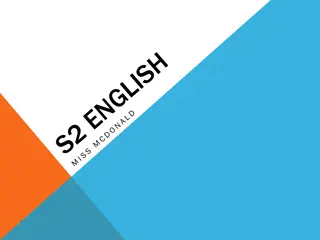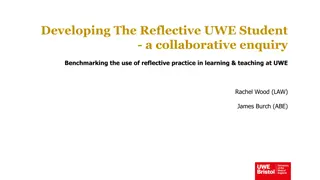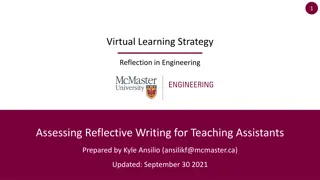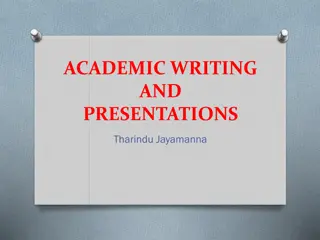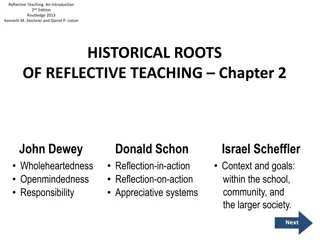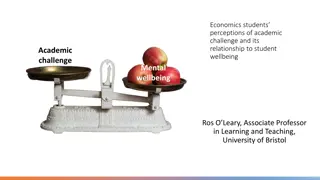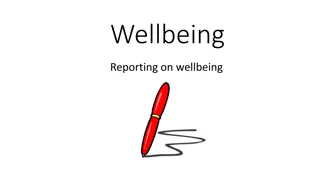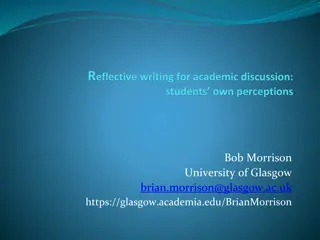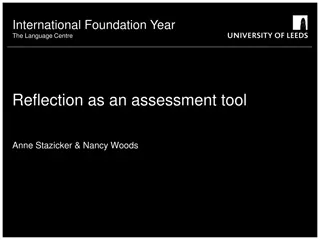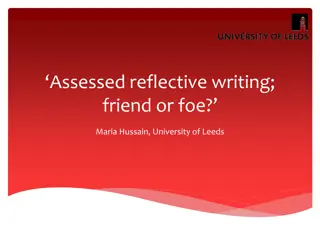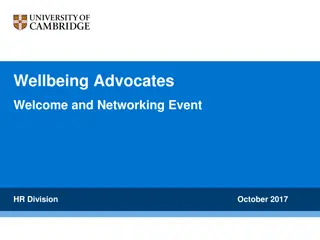Enhancing Wellbeing through Reflective Writing for Academic Success
Explore the connection between writing and thinking for academic growth, emphasizing the importance of reflecting on your writing process. Learn various writing strategies and exercises to improve your PhD journey while nurturing your mental well-being.
Download Presentation

Please find below an Image/Link to download the presentation.
The content on the website is provided AS IS for your information and personal use only. It may not be sold, licensed, or shared on other websites without obtaining consent from the author. Download presentation by click this link. If you encounter any issues during the download, it is possible that the publisher has removed the file from their server.
E N D
Presentation Transcript
Wellbeing When Writing Writing as Thinking I Year 1
Delivered by: Delivered by: [Facilitator Name], [Facilitator Title}
Learning outcomes: Learning outcomes: Identify and discuss your own approach to writing for your PhD Practice a range of writing & wellbeing exercises that you could use in your own studies Evaluate the statement: writing is thinking Design your own writing strategy
Identify and discuss your own approach to Identify and discuss your own approach to writing for your PhD writing for your PhD Question 1: What place do you think writing has in PhD research? Question 2: What are your preferred approaches to writing?
Practice and evaluate a range of writing Practice and evaluate a range of writing exercises that you could use in your own studies exercises that you could use in your own studies Timed free-writing exercise: Write whatever is on your mind for the next five minutes.
Begin writing about anything that Begin writing about anything that comes to mind comes to mind This strategy is particularly useful if you have written very little so far. Think of it as a warm-up exercise to get your creative juices flowing. For example you could begin by writing about your preliminary data, data published by others, or the goals of your research. Do not worry about grammar or even accuracy. Just get words on the page for about 15-20 minutes.
Begin writing about anything that Begin writing about anything that comes to mind comes to mind Ideas are born with writing, and the more you write the more ideas you will have. Even when you are in a rhythm of writing, it helps to begin your day by just jotting down ideas for the first 15-20 minutes. Remember, ideas are useless inside your mind they need to be on paper and explained so others (particularly your thesis committee) can understand them. Most of this writing will not make it into your final draft, but it will help you to create new ideas.
Directed free writing Directed free writing Free writing works best, ironically, if you direct it carefully. You can do this quite simply by writing a question or statement at the top of the page to use as a guide for your writing. Questions that start with how work well, for instance: how do I know that free writing works? or how might we get more people to do writing exercises? In case you haven t already worked it out, the word how is good to use at the start of research questions because it prompts a wide range of responses. https://thesiswhisperer.com/2014/06/04/two-exercises-to-help- you-with-your-writing/
Directed free writing Directed free writing Timed directed writing exercise write for five minutes on: Who are you? What is your PhD research topic? How did you come to be researching in this area?
Note taking and redrafting Note taking and redrafting Note down five key words from your free-writing on a fresh piece of paper (condensation/distillation) Tear/screw up and throw away your original free-writing (freedom to begin afresh) Re-write your response, using the key words as prompts (editing/redrafting)
Thinking creatively Thinking creatively Imagine your thesis is an animal: What kind of animal is it? How does it behave? What is its habitat? Is it a daytime creature or nocturnal? Is it carnivorous, or not?
Practice and evaluate a range of writing exercises Practice and evaluate a range of writing exercises that you could use in your own studies that you could use in your own studies Can you identify three writing strategies we ve just tried? How might any of these practices be useful for you in your studies?
Introductions and project summaries Introductions and project summaries Move around the room introducing yourself and your project, making networks, connections, collaborations
Evaluate the statement: writing is Evaluate the statement: writing is thinking thinking Think about the relation between writing and thinking i.e., that writing is necessary for rigorous thinking, indeed that writing is thinking. This is true for all writing, whether scientific or more discursive.
Writing as thinking Writing as thinking Read stimulus text and write for ten minutes to process ideas every time! Start writing about anything that comes to mind Focus on your research question / the bigger picture of your PhD
Writing as thinking Writing as thinking Do you agree that writing is thinking ? Why/why not?
Physical wellbeing exercises, rest Physical wellbeing exercises, rest- -breaks & strategies for movement strategies for movement breaks & https://www.fnu.edu/8-health-wellness-tips-college- students/ https://www.york.ac.uk/students/health/wellbeing/ Embodiment read the stimulus text and move key ideas through your body / join up with others / create collaborative movement strategies for communicating key ideas
Breathing for wellbeing Breathing for wellbeing Try the Three Minute Breathing Space Practice , here: https://www.mindful.org/the-three-minute-breathing-space- practice/
Design your own writing strategy Design your own writing strategy Write every day practical strategies for building a writing routine http://www.nextscientist.com/writers-block-phd-students In a group or on your own, design your own strategy for writing as a regular part of your PhD process.
Plenary discussion: Plenary discussion: What are five words you associate with the writing process? When you are about to begin a new piece of writing, how do you feel? Why do you think writing makes you feel like this? What for you are the main pleasures of writing? And what are the main obstacles? What are the strategies you have developed/will develop to help your writing process?
Further info (online) Further info (online) #PhDchat #PhDAdvice #AcWri #ShutUpAndWrite @WriteThatPhD https://thesiswhisperer.com https://www.vitae.ac.uk
General Mathematics







